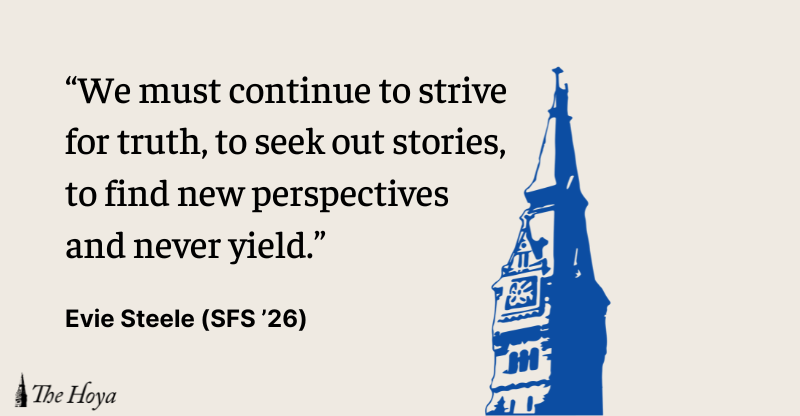
I was in high school when I first read Alfred, Lord Tennyson’s 1833 poem “Ulysses,” which chronicles the title character’s reflection on his years of travel, as recorded in Homer’s “Odyssey.” Though aging and facing impending mortality, Ulysses remains determined “to strive, to seek, to find and not to yield.”
To strive, to seek, to find and not to yield: These tasks have defined my time as a student journalist here at Georgetown University and as editor-in-chief of this publication. Though I am now on my way out of The Hoya, I urge you — not just campus media reporters, but all students — to continue this work.
In the current campus environment, free speech is under threat. Attacks on dissenting viewpoints have escalated to the point that students, including here at Georgetown, have lost their visas for speaking their minds. Indeed, the federal detention of Tufts University graduate student Rümeysa Öztürk, seemingly for writing a pro-Palestinian opinion piece in the university’s student newspaper, demonstrates the stakes and consequences of these attacks on dissenting journalism.
The tenor of our arguments so often suffocates genuine attempts at forging nuanced dialogue: We berate those who disagree, squeezing out opinions somewhere in the middle and creating a chilling effect on speech. And while it’s fair to criticize opinions that denigrate or minimize others, this response can go too far — we push out legitimate and good-faith perspectives before we get a chance to understand them in full. It should not be this uncomfortable or dangerous to publicly disagree.
Amid this zeitgeist, it is so easy to fall into an echo chamber, refuse to tolerate disagreement and ignore opinions with which we take issue rather than recognizing what they can teach us.
In my experience, this environment has made student journalism far more difficult. Reporting can be a thankless task. Negative comments litter my social media feeds and email inboxes, while positive words take a bit more scrolling to find. Sometimes this criticism is warranted: The Hoya’s coverage of campus and city issues is not perfect, after all.
Yet this environment also makes student journalists’ work even more critical. Good journalism can force institutions like Georgetown to publicly address uncomfortable truths and work towards solutions to campus problems. It can spur community members who disagree to engage with each other’s opinions. And, most powerfully, it can foster the nuanced dialogue our campus often lacks, lowering the temperature and the volume of conflict to provide space for a diversity of perspectives.
In “Ulysses,” Tennyson writes, “Tho’ much is taken, much abides.” Though much around us changes, much — our shared interest in building a better community and university — abides. In my time as a student journalist, I have always believed that one of journalism’s many powers lies in pushing our community to cherish and celebrate those commonalities, even as we argue.
To my dear friends at The Hoya and other campus media outlets, this work is a prerogative that comes with the platform we have. Even when it’s difficult, even when our Twitter or Instagram or, god forbid, Fizz accounts are overwhelmingly negative, it is always our responsibility to keep writing, ensuring community members can trust us with their quotes and their perspectives. We must continue to strive for truth, to seek out stories, to find new perspectives and never yield.
To our readers, students and community members, I urge you, too, to write. Scary and uncomfortable though it can be, I firmly believe that it is your perspectives — open, detailed and honest — that move us closer to real change in our political dialogue and eventually real change in our world.
As Tennyson’s title character tells his sailors as he prepares to set sail on one final voyage, “Come, my friends, / ’Tis not too late to seek a newer world.” As I publish my final issue as editor-in-chief of The Hoya, I urge you to write your way to this newer and better world.
Evie Steele is a junior in the School of Foreign Service and the 151st editor-in-chief of The Hoya. Her term ends Friday.